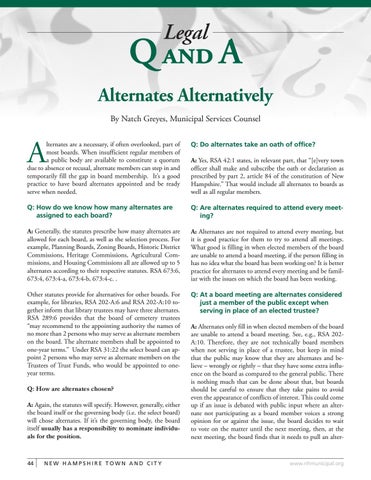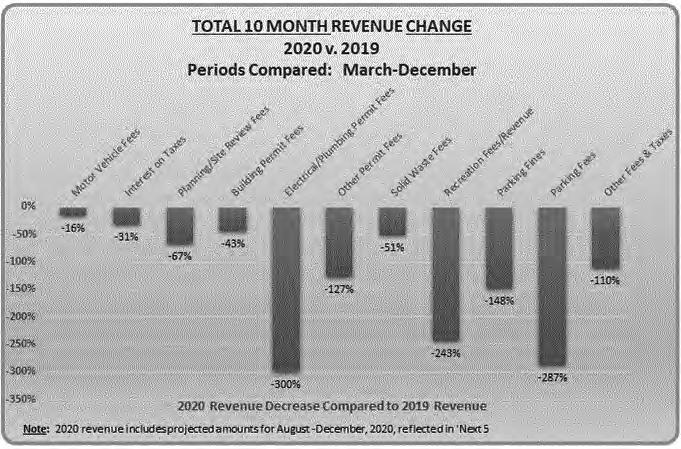Legal
Q and A Alternates Alternatively By Natch Greyes, Municipal Services Counsel
A
lternates are a necessary, if often overlooked, part of most boards. When insufficient regular members of a public body are available to constitute a quorum due to absence or recusal, alternate members can step in and temporarily fill the gap in board membership. It’s a good practice to have board alternates appointed and be ready serve when needed.
Q: Do alternates take an oath of office?
Q: How do we know how many alternates are assigned to each board?
Q: Are alternates required to attend every meeting?
A: Generally, the statutes prescribe how many alternates are allowed for each board, as well as the selection process. For example, Planning Boards, Zoning Boards, Historic District Commissions, Heritage Commissions, Agricultural Commissions, and Housing Commissions all are allowed up to 5 alternates according to their respective statutes. RSA 673:6, 673:4, 673:4-a, 673:4-b, 673:4-c. .
A: Alternates are not required to attend every meeting, but it is good practice for them to try to attend all meetings. What good is filling in when elected members of the board are unable to attend a board meeting, if the person filling in has no idea what the board has been working on? It is better practice for alternates to attend every meeting and be familiar with the issues on which the board has been working.
Other statutes provide for alternatives for other boards. For example, for libraries, RSA 202-A:6 and RSA 202-A:10 together inform that library trustees may have three alternates. RSA 289:6 provides that the board of cemetery trustees “may recommend to the appointing authority the names of no more than 2 persons who may serve as alternate members on the board. The alternate members shall be appointed to one-year terms.” Under RSA 31:22 the select board can appoint 2 persons who may serve as alternate members on the Trustees of Trust Funds, who would be appointed to oneyear terms.
Q: At a board meeting are alternates considered just a member of the public except when serving in place of an elected trustee?
Q: How are alternates chosen? A: Again, the statutes will specify. However, generally, either the board itself or the governing body (i.e. the select board) will chose alternates. If it’s the governing body, the board itself usually has a responsibility to nominate individuals for the position.
44
NEW HAMPSHIRE TOWN AND CITY
A: Yes, RSA 42:1 states, in relevant part, that “[e]very town officer shall make and subscribe the oath or declaration as prescribed by part 2, article 84 of the constitution of New Hampshire.” That would include all alternates to boards as well as all regular members.
A: Alternates only fill in when elected members of the board are unable to attend a board meeting. See, e.g., RSA 202A:10. Therefore, they are not technically board members when not serving in place of a trustee, but keep in mind that the public may know that they are alternates and believe – wrongly or rightly – that they have some extra influence on the board as compared to the general public. There is nothing much that can be done about that, but boards should be careful to ensure that they take pains to avoid even the appearance of conflicts of interest. This could come up if an issue is debated with public input where an alternate not participating as a board member voices a strong opinion for or against the issue, the board decides to wait to vote on the matter until the next meeting, then, at the next meeting, the board finds that it needs to pull an alter-
www.nhmunicipal.org







